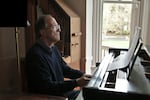
Robert Kyr previews his new piano concerto a couple of months before its May 12 premiere closes the 50th season of the Eugene Symphony.
John Strieder / OPB
It’s a sunny winter day on the University of Oregon campus, and Robert Kyr is nervous.
“I never, ever, ever, ever do this for anyone, so I'm quite anxious about doing this,” he said.
He has completed the first movement of a piano concerto, and he is about to play us the primary theme. “I'm going to give you a few takes,” he said. “I'm just gonna play for a while and tell you which ones work. Is that OK?”
Kyr chairs the composition department at the University of Oregon. When he composes, he sits in a hardback chair, working for up to 14 hours at a stretch until he can't sit up anymore.
He has composed symphonies, violin concerti and choral works. But this is the first piano concerto of his adult career.
Kyr’s piece, “Dawning of the World (Piano Concerto No. 1),” will premiere in May as the finale of the Eugene Symphony’s 50th season.
Daneil Rachev, music director and conductor of the Eugene Symphony, is waiting for Kyr to deliver the finished piece. “I hope I can see his music sooner rather than later so I have enough time to live with it a little bit,” Rachev said. “We are already only a few months before May. So hopefully soon.”
The Eugene Symphony has a reputation for programming challenging works. But the symphony is pushing itself to a new level for its 50th anniversary season with three new commissions.
“The main part of the concert of that day, the final concert of the season, the focus is Beethoven's Ninth and here I was asked to create a Piano Concerto for the first half, so of course, there’s no pressure,” Kyr said.
Casual music fans don’t always realize that when a new orchestral work is commissioned; no one hears the piece fully performed until the limited rehearsals before the show. That, says Rachev, presents a challenge.
“The musicians can't just go online and look for a CD and find that piece and listen to it and say ‘this is how this part goes.’ They will hear it at rehearsal, as I will, and then we will decide what we're going to do with it, and the composers are there, so they come and tell us their opinions — we should do a little different here or maybe the tempo should be a little bit faster. The piece is born after a lot of mothers have it.”
Three new commissions for the 50th
Commissioning new work also requires a bigger budget than simply mounting a well-known standard. And yet, the Eugene Symphony celebrated its 50th year with premieres from three world-class composers:
- The season opened in September with a work by Mason Bates, one of the most performed living composers in the country according to a recent survey by the Baltimore Symphony Orchestra. Bates' piece, "Gramophone Depot," was inspired by the composer's memories of listening to his dad's old swing and jazz records. "I think Mason Bates is more evolutionary than revolutionary," said Eugene Symphony executive director Scott Freck He's referring back to music that was important to him and his father and, at the same time, making it relevant for his generation."
- The second world premiere, performed in December, was by Roberto Sierra. Its title, "Loíza," is taken from a town in Sierra's homeland, Puerto Rico. "It always has this conga drum beat in the middle," Freck said, "and the texture gets fuller, the texture gets thinner, but it never gets old. I defied some of my friends in the audience not to bob their heads, which is not something you'd always expect at an orchestra concert."
- "Dawning of the World (Piano Concerto No. 1)," by Robert Kyr, will close the season May 12.
"In the last 10 years, I think there's only been one solo commission where we were the only orchestra involved, and that was Tomás Svoboda's 'Clarinet Concerto' three years ago," Freck said. "To do three in one year, that's a pretty big statement for me. It's an intentional statement that new music matters; new music belongs on the stage and is every bit as valid as the old stuff."
Robert Kyr said the Eugene Symphony’s commitment to new music is remarkable. "It's commissioning three pieces from composers with very different backgrounds and interests. A real coup for the symphony and for our region. You can look at the other major symphonies around the country to see that nobody's doing that."
Freck admits that there’s no guarantee everyone will like the new works, just as there’s no guarantee people will like Beethoven. The new works bring in a younger crowd, Freck said. “When we have a brand new piece of music, or relatively new, we tend to see that audience average audience age goes down, we tend to have more younger people coming. There's an openness; there's a hunger for knowing new music that's written by the current generation.”
Freck says the 50th anniversary programming helped account for an increase of 4% in total subscription tickets and more than 10% growth in subscription revenue compared to last year. And he says the Orchestra also set an all-time record for corporate sponsorship in 2015, beating the previous high by 20 percent.
Every year can’t be the 50th, but still, he hopes it’s a trend.